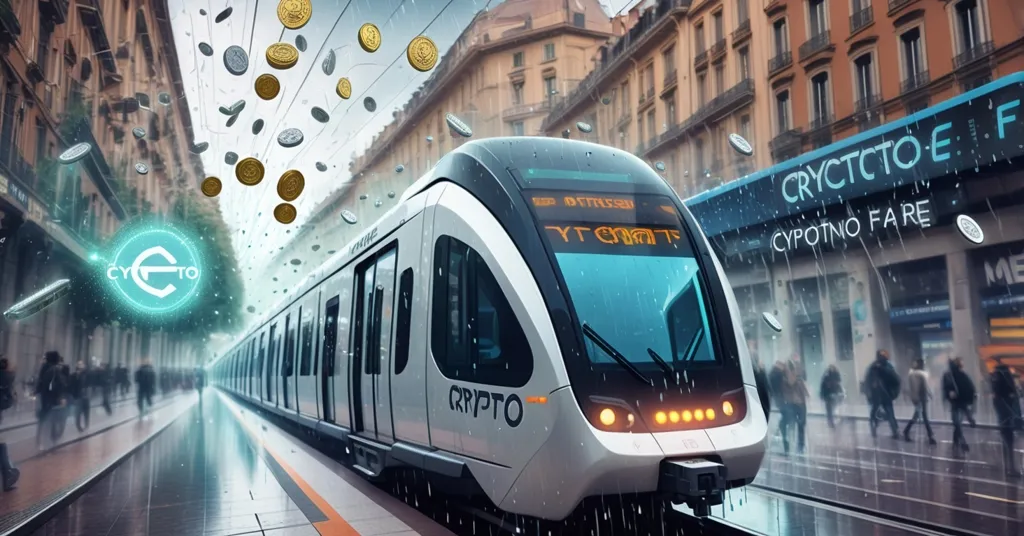Toulouse Pioneers Crypto Payments for Public Transport in Europe

Toulouse Leads Europe in Crypto Payments for Public Transport
Toulouse, France, has boldly stepped into the future by becoming the first European city to accept Bitcoin and other cryptocurrencies for public transport fares, starting March 17. This pioneering move not only marks a significant milestone in the integration of crypto into everyday life but also reflects France’s broader push towards becoming a hub for crypto-friendly services.
- Toulouse first European city to accept crypto for public transport
- Tisséo app supports over 70 cryptocurrencies
- Instant conversion to euros facilitated by fintech company Lyzi
- Experimental initiative with broader implications for crypto adoption
The initiative, spearheaded by Tisséo, Toulouse’s public transport operator, allows residents to purchase tickets for metro, tram, cable car, and bus services through an Android app. This app supports over 70 cryptocurrencies, including Bitcoin, and instantly converts them into euros, ensuring seamless transactions. The system was developed in collaboration with Paris-based fintech company Lyzi, which helps turn your crypto into euros instantly, making it easy to buy tickets.
While the move is experimental, aimed at assessing the long-term viability of crypto in daily transactions, it’s part of a broader trend. Other French cities like Cannes are also exploring similar systems, indicating a national shift towards crypto-friendly services. Toulouse’s Deputy Mayor, Sacha Briand, emphasized the experimental nature of the initiative, stating,
“The initiative is experimental as the company wants to check how widespread the use of crypto can become in the long run.”
This reflects the city’s commitment to understanding the potential and challenges of crypto integration. Cryptocurrencies, digital or virtual currencies that use cryptography for security and operate on decentralized networks, are at the heart of this experiment.
The involvement of intermediaries like Binance Pay, though, has stirred some controversy. While Binance’s platform ensures faster transaction executions, some Bitcoin maximalists criticize this reliance on centralized platforms, advocating for a more decentralized approach. Despite such debates, the integration of crypto into public transport could pave the way for broader adoption in France, where around 18% of citizens hold cryptocurrencies, according to a 2024 Gemini report.
However, crypto transactions in France come with their own set of challenges, including a 30% capital gains tax. Capital gains tax is a tax on the profit made from selling assets like cryptocurrencies, and it must be declared via form 3916-bis. This could potentially deter some users from adopting crypto for everyday purchases like public transport tickets. Yet, France’s adoption of general crypto regulations in 2020, which made cryptocurrency storage and transactions legal, has set the stage for innovative uses like this.
Toulouse’s initiative is not an isolated case. Globally, cities such as Dubai, Zug, and Hong Kong have also embraced cryptocurrencies for various services, from hotels and malls to real estate and even taxes. This trend underscores a growing acceptance of crypto as a legitimate means of transaction, despite the challenges of price fluctuations and regulatory compliance.
While the Tisséo app’s limitation to Android users might pose an accessibility challenge, the potential for other French cities to follow suit is significant. As France continues to modernize its payment systems, integrating cryptocurrencies into daily life could become more commonplace, potentially revolutionizing how we think about money and financial transactions. The launch of this system in Toulouse marks a crucial step in this direction.
Key Takeaways and Questions
- What is the significance of Toulouse accepting crypto for public transport?
Toulouse’s move signifies a pioneering step in Europe, reflecting France’s broader embrace of crypto-friendly services and setting a precedent for other cities.
- How does the Tisséo app work for crypto payments?
The Tisséo app on Android devices supports over 70 cryptocurrencies, instantly converting them into euros for purchasing public transport tickets.
- What are the challenges associated with using crypto for public transport in Toulouse?
Challenges include the reliance on intermediaries like Binance, which some Bitcoin maximalists criticize, and the 30% capital gains tax on crypto transactions.
- How does France’s crypto adoption compare to other countries?
France is actively promoting crypto adoption, with 18% of its citizens holding crypto, aligning with global trends seen in cities like Dubai, Zug, and Hong Kong.
- What is the long-term goal of Toulouse’s crypto payment initiative?
The goal is to assess the long-term viability and potential widespread use of crypto in daily transactions, reflecting the city’s interest in cryptocurrency integration.
As we witness Toulouse’s experiment unfold, it’s clear that the journey of integrating cryptocurrencies into public services is just beginning. With both optimism and realism, we’ll keep our eyes peeled for how this bold move shapes the future of financial transactions, not just in France but around the world. Discussions and insights on this topic can be found on platforms like Reddit and Quora. For more in-depth analysis on the challenges, visit OneSafe’s blog.



